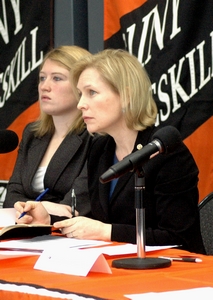Subscriptions
Menu
Advertisements
Gillibrand gets laundry list of ag worries
2/23/2011 |
By Patsy Nicosia |

If we think we’re going to solve our agricultural problems by waving money at it, we’ve got another thing coming.
That’s just one piece of advice United States Senator Kirsten Gillibrand got Friday on her Listening Tour stop at SUNY Cobleskill.
US Senator Gillibrand is the first New Yorker in 40 years to serve on the Senate’s Agriculture Committee; Friday’s hour-long session was a way to gather farmers’ thoughts on the 2012 Farm Bill.
It was also a chance for Senator Gillibrand to offer her own ideas on everything from milk pricing to renewable energy.
Only a few of those taking the microphone were dairy farmers, but milk prices were on their minds too.
“We’re not going to get anywhere until we get dairy farmers to agree on one pricing solution,” said Cobleskill dairyman John Radliff.
Senator Gillibrand agreed that’s one of the most important pieces of the next Farm Bill:
A fair price for producers.
“What we have now is outdated,” she said, with dairy farmers too often getting less for their milk than it costs to produce it.
“We need the industry not to just survive, but thrive. We also need more transparency when it comes to pricing.”
Congress has already begun debating the next Farm Bill and Senator Gillibrand said Friday that there’s some talk of addressing dairy pricing this year instead of waiting till ’12.
“If we can get the easy stuff done this year...Everything in the Farm Bill is about negotiation,” she added.
Mr. Radliff also spoke to the importance of continued funding for the New York Center for Agricultural Medicine and Health, which is based in Cooperstown.
A grassroots program, NYCAMH has helped farmers pay for rollover protection bars for tractors, something that might have saved the life of his friend, David Huse, killed in a car-tractor accident last year.
The state budget has eliminated funding for the program, Mr. Radliff said, and there’s a proposal to have OSHA take over other NYCAMH programs.
“When people are dying, when families are hurting, that’s the most important thing we should be talking about,” he said.
Peter Ten Eyck, owner of Indian Farms in Altamont, spoke to the importance of “keeping our eye on the prize” when it comes to food.
“Otherwise, we’re going to have hungry people...waving money in the air hoping someone’s going to bring us something to eat,” he said.
Senator Gillibrand seconded that thought.
“No one’s happy with our dependence on foreign countries for oil, she said; we surely don’t want to have to start depending on countries like China for food.”
Linda Cross, a Carlisle sheep farmer, said it’s important to encourage more women to go into agriculture.
Middleburgh dairyman Fred Risse reminded Senator Gillibrand that the United States produces the cheapest food in the world and receives just 17 percent of USDA funding; most, he said, goes instead to things like food stamps.
Richard Ball of Schoharie Valley Farms and the Carrot Barn, said crop farmers are looking down the barrel of a gun when it comes to federal legislation impacting things like guest workers and child labor laws.
Judy Pangman, who has a small Carlisle grass-fed farm, said she needs more information on how the just-passed Food Safety Act will impact her business.
Joan Bent of Seward called clean water one of the region’s most important natural resources and said she’s worried about how hydrofracking could endanger that.
“Hydrofracking obviously offers great economic opportunities,” said Senator Gillibrand, “but we want to make sure...it’s done safely. We really need more disclosure before we go out and destroy our drinking water.”









